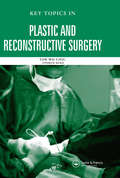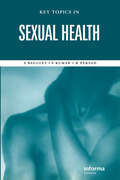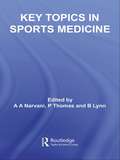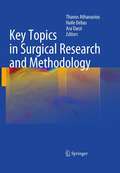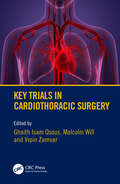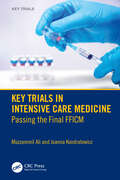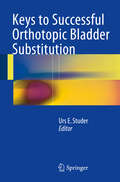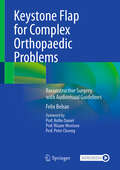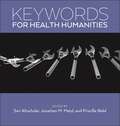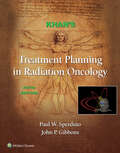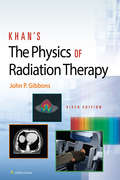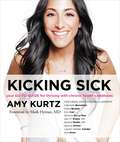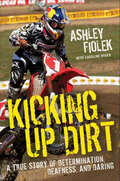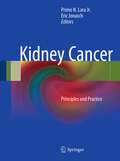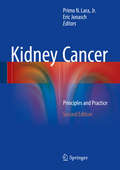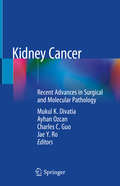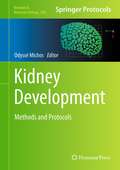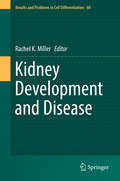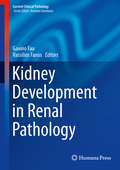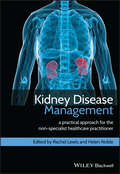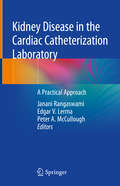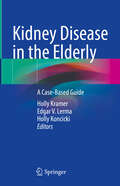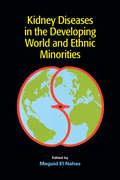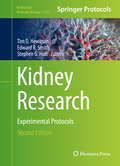- Table View
- List View
Key Topics in Plastic and Reconstructive Surgery
by Tor Wo Chiu Andrew BurdBased on the teaching of plastic and reconstructive surgery at a university hospital, Key Topics in Plastic and Reconstructive Surgery is a unique resource that provides succinct guidance to the core topics in this rapidly developing field for all student surgeons. Using clear, descriptive prose and illustrations as necessary to explain the importa
Key Topics in Sexual Health
by Sunil Kumar Raj Persad Steve BaguleyThis impeccably researched text provides the reader with a comprehensive overview of sexual health, exploring a range of topics such as:sexually transmitted infectionscontraceptionurological conditionsgenital dermatosessexual dysfunctionnovel therapeutic options.With a clear, symptom-based format, this is an ideal quick reference guide for the consulting room and the ward.
Key Topics in Sports Medicine
by A A Narvani P Thomas B LynnStudents have often commented on the need for a concise textbook on sports medicine that presents the essential information otherwise scattered across several much larger medical textbooks on other topics. Addressing this need, Key Topics in Sports Medicine makes effective use of the successful Key Topics format to provide extensive relevant information in an accessible and easy-to-follow manner. Practical and clearly presented, this is an invaluable resource for those students and practioners of sports medicine and rehabilitation, athletic training, physiotherapy and orthopedic surgery.
Key Topics in Surgical Research and Methodology
by Ara Darzi Thanos Athanasiou H. DebasKey Topics in Surgical Research and Methodology represents a comprehensive reference text accessible to the surgeon embarking on an academic career. Key themes emphasize and summarize the text. Four key elements are covered, i.e. Surgical Research, Research Methodology, Practical Problems and Solutions on Research as well as Recent Developments and Future Prospects in Surgical Research and Practice.
Key Trials in Cardiothoracic Surgery
by Ghaith Isam Qsous Malcolm Will Vipin ZamvarA concise summary of the most important clinical trials in cardiac and thoracic surgery. The focus is on how evidence-based decision making has helped to shape modern practice and guidelines. The key trials are described and an overview of their impact provided. Much research has been undertaken to study the efficacy of different drugs, techniques, and treatment strategies within cardiothoracic surgery. As a result, many randomised controlled trials have been published which discuss a wide variety of topics and with the intention of improving current practice and patient care. This volume presents a selection of the key trials and assesses their impact. Compact and easy to read, the distillation of core information will enable the reader to understand the importance of the key papers that have influenced best practice across operating theatres, clinics, multi-disciplinary meetings, and inpatient management. Including full summaries of more than 30 trials and reflecting the clinical scenarios encountered in everyday practice by cardiothoracic surgeons, this concise volume is written for both trainee and more experienced members of the surgical team.
Key Trials in Intensive Care Medicine: Passing the Final FFICM (Key Trials)
by Muzzammil Ali Joanna KondratowiczThis essential guide encompasses over 160 pivotal papers critical for doctors preparing for postgraduate exams in intensive care, interviews, or commencing an intensive care rotation. Chosen for their educational merit and significant influence on intensive care medicine, these key trials, studies, and meta-analyses are distilled into succinct, easy-to-read summaries.The guide steers clear of intricate numerical details and statistical analyses, concentrating instead on the core information necessary to comprehend the significance of these influential papers. Tailored specifically for the OSCE and SOE components of exams like the Final FFICM and EDIC, it provides concise summaries and key results, focusing on the most crucial information for exam success.Serving as a resource that underpins the evidence base of contemporary intensive care clinical practice, these summaries are an indispensable tool for both exam preparation and ongoing professional development in intensive care medicine.
Keys to Successful Orthotopic Bladder Substitution
by Urs E. StuderThis book provides clear guidance on how to achieve excellent functional results and avoid failures when performing cystectomy and orthotopic bladder substitution. The opening sections present helpful checklists relating to patient selection, preoperative management, the procedures themselves, intraoperative measures, postoperative management, and actions to be taken in the event of various symptoms and complications. The remainder of the book focuses in detail on a variety of specific points of interest such as how and why to attempt a nerve-sparing cystectomy, the role of pelvic lymph node dissection, physical and physiological considerations relevant to reservoir construction, metabolic consequences of the incorporation of bowel into the urinary tract, preservation of renal function, and quality of life issues. The information provided may not only be instrumental to urologists, but also to specialized health care professionals, as well as the concerned patients.
Keys to the Trematoda, Volume 3
by David Gibson David Blair John Pearson Arlene Jones Stephane Deblock R Madhavi Tomas Scholz Diane Barton Thomas Cribb S Pozdnyakov T Pojmañska Vasyl Tkach Ronald Campbell William Font Jeffrey Lotz C Santos Rodney Bray Terrence MillerThis is the third of three volumes of Keys to the Trematoda, a series on the systematics and identification of the Class Trematoda. It covers five superfamilies with the Order Plagiorchiida and the family Didymozoidae, with the keys for their identification at the family, subfamily and generic levels. It also includes a key to all dignean superfamilies, including those treated in detail in volumes oneand two.
Keystone Flap for Complex Orthopaedic Problems: Reconstructive Surgery with Audiovisual Guidelines
by Felix BehanKDPIF, or Keystone Design Perforator Island Flap, is the main reconstructive tool available as a valid alternative to microsurgical procedures; its low complication rate is the key to its surgical success. This stepwise guide illustrates the technique’s applications in orthopaedic reconstruction. The sections of the book cover the upper limb (including Dupuytren’s disease), the lower limb defects (from groin to foot) and the rare vascular complications of the technique. The illustrations range from simple to complex cases in an easy-to-follow format, with audio files, acting as a supplementary tool to amplify and illustrate the technique to enhance the reader’s experience and foster clear understanding. The basic design format for all Keystones are highlighted, all sitting within the dermatomal precincts. The KDPIF must contain a fascial base for lining and must be aligned within the dermatomal precincts. This island outline is an essential pre-requisite for its success. It is hypothesized that this islanding creates a sympathectomy effect resulting in hyperaemic blood flow which optimises healing: the KDPIF technique provides an alternative to microvascular procedures where the biggest drawback is tissue match. The KDPIF addresses this problem admirably with a low pain component, an excellent aesthetic match with a low vascular complication rate and executed in an expeditious manner with sensory recovery and resolution of oedema. Keystone Flap for Complex Orthopaedic Problems: Reconstructive Surgery with Audiovisual Guidelines will be a valued companion to plastic and reconstructive surgeons and orthopaedic surgeons, that might find a valid alternative to microsurgical techniques.
Keywords for Health Humanities (Keywords)
by Priscilla Wald Jonathan M. Metzl Sari AltschulerIntroduces key concepts and debates in health humanities and the health professions.Keywords for Health Humanities provides a rich, interdisciplinary vocabulary for the burgeoning field of health humanities and, more broadly, for the study of medicine and health. Sixty-five entries by leading international scholars examine current practices, ideas, histories, and debates around health and illness, revealing the social, cultural, and political factors that structure health conditions and shape health outcomes.Presenting possibilities for health justice and social change, this volume exposes readers—from curious beginners to cultural analysts, from medical students to health care practitioners of all fields—to lively debates about the complexities of health and illness and their ethical and political implications. A study of the vocabulary that comprises and shapes a broad understanding of health and the practices of healthcare, Keywords for Health Humanities guides readers toward ways to communicate accurately and effectively while engaging in creative analytical thinking about health and healthcare in an increasingly complex world—one in which seemingly straightforward beliefs and decisions about individual and communal health represent increasingly contested terrain.The online essays for all Keywords titles can be found here: keywords.nyupress.org
Khan's Treatment Planning in Radiation Oncology: .
by John P. Gibbons Faiz M. Khan Paul W. SperdutoOffering comprehensive coverage of the clinical, physical, and technical aspects of radiation treatment planning, Khan’s Treatment Planning in Radiation Oncology, Fifth Edition, provides a team approach to this complex field. Drs. Paul W. Sperduto and John P. Gibbons are joined by expert contributing authors who focus on the application of physical and clinical concepts to solve treatment planning problems—helping you provide effective, state-of-the-art care for cancer patients. This unique, well-regarded text has been updated throughout to reflect the most current practices in today’s radiation oncology treatment.
Khan’s The Physics of Radiation Therapy
by John P. GibbonsA vital reference for the entire radiation oncology team, Khan’s The Physics of Radiation Therapy thoroughly covers the physics and practical clinical applications of advanced radiation therapy technologies. Dr. John Gibbons carries on the tradition established by Dr. Khan in previous editions, ensuring that the 6th Edition provides state-of-the-art information for radiation oncologists, medical physicists, dosimetrists, radiation therapists, and residents alike. This updated classic remains the most practical radiation therapy physics text available, offering an ideal balance between theory and clinical application.
Kicking Sick: Your Go-to Guide For Thriving With Chronic Health Conditions
by Amy KurtzHas a chronic health issue taken over your life? More than half of us in the US are struggling with at least one. Amy Kurtz gets it. Starting in her mid-teens, she endured two perfect storms of illness that progressed into her twenties. It earned her the label "the sick chick"--and the shame, fear, isolation, and frustration that comes with it. She's radically improved her health, and today she's helping men and women of all ages live well regardless of their health situation. With honesty, humor, and empathy, Kicking Sick shows you how to jettison despair, tune in to your body and inner wisdom, take charge, and build an effective support circle of medical experts, friends, and family. Kicking Sick also brings you essential advice from Amy's own A-team of experts--the ones crucial to her own turnaround: her personal physician Mark Hyman, gastroenterologist Gerard Mullin, endocrinologist Philip Felig, Crazy Sexy Cancer author Kris Carr, new thought leader Gabby Bernstein, and renowned yogi Elena Brower, plus many real life "glow warriors. "
Kicking Up Dirt: A True Story of Determination, Deafness, and Daring
by Ashley Fiolek Caroline RyderAt nineteen, Ashley Fiolek is already the top female competitor in a tough men's sport: motocross, a form of off-road motorcycle racing that is one of the most competitive and dangerous extreme sports in the world. Since going pro in late 2007, Fiolek has taken gold at the X Games, won the American Women's Motocross Championship twice, and become the first woman in American motocross history to be signed to a factory team—the highest echelon of industry backing. But Fiolek's rise has not come without obstacles. Fiolek was born profoundly deaf, a handicap that makes everyday life difficult—and competition on the track downright dangerous. Originally misdiagnosed as "mildly retarded," she was a painfully shy and introverted child—until her parents introduced her to the world of dirt bikes, which helped her escape the silence in her head and connect with others who shared her passion. She began racing at seven, and as her successes grew through hard work and no small number of broken bones, so did her confidence.Fiolek has never believed her disability should stand in the way of her dreams. Nor has she allowed her gender to limit her career—motocross historically has been a men's sport, but with the love and support of her dirt-obsessed family, including her "Grandpa Motorcycle," her little brother, Kicker, and her dogs, Turbo and Rocco, Ashley has emerged as one of the sport's most talked-about stars, changing the way the entire industry views women. Armed with her extraordinary talent, contagious grin, and deep faith in God, Fiolek continues to venture into unknown territory, relentlessly pushing herself—and women's motocross—to ever-greater heights.Kicking Up Dirt is a remarkable, inspiring tale of a young woman's courage and determination to succeed in the face of truly challenging obstacles.
Kidney Cancer
by Primo N. Lara Jr. Eric JonaschThis interdisciplinary textbook encompasses all clinically relevant aspects of the disease and is designed to be as user-friendly as possible in order to meet the needs of the busy practitioner. To this end, the informative text is complemented by helpful boxed sections that present essential 'take home' points and illustrative patient-oriented cases. Original high-quality images, some in color, are included whenever necessary to simplify particularly complex material. The authors are an international group of acknowledged experts in kidney cancer epidemiology, molecular biology, pathology, diagnosis, clinical features, staging, prognostic and predictive factors, surgery, systemic therapy, and emerging investigational approaches, among others. This clinically oriented volume will be of great interest to clinicians, researchers, residents, and fellows, as well as to students and knowledgeable lay people.
Kidney Cancer
by Eric Jonasch Primo N. LaraKidney Cancer: Principles and Practice is a comprehensive and interdisciplinary textbook that encompasses all clinically relevant aspects of the disease. This new edition has been extensively updated and includes brand new material covering the most recent developments in kidney cancer diagnosis and therapy. The user-friendly and clinically oriented content of the book guarantees that it will be of great interest to a wide range of medical professionals, and every effort has been made to ensure that contributions are both easy to understand and directly related to patient care. Content presentation departs from the usual dense chapter format featuring a lengthy series of paragraphs. Instead, each chapter contains several boxed sections, including one that summarizes essential "take home points" for the busy clinician and another that presents a patient-oriented case highlighting the clinical application of elements discussed in that chapter. In addition, accessible original images, illustrations, and diagrams (some in full color) are used to simplify particularly complex material. This book will be of value for clinicians, researchers, residents, fellows, students, and knowledgeable lay people. The contributors comprise an international group of authors with expertise in kidney cancer epidemiology, molecular biology, pathology, diagnosis, clinical features, staging, prognostic and predictive factors, surgery, systemic therapy, and emerging investigational approaches, among others.
Kidney Cancer: Recent Advances in Surgical and Molecular Pathology
by Jae Y. Ro Mukul K. Divatia Ayhan Ozcan Charles C. GuoThis book provides a comprehensive overview of pathology of kidney tumors along with radiological features and up to date treatment strategies that enable the readers to avail this information in day to day pathology sign-out as well as interaction with clinical colleagues of different disciplines. It also serves as a referral resource for the current medical or surgical practice while preparing for examinations or maintenance of certification. Written by experts in the field, chapters contain an updated review of important pathologic parameters mandated for diagnosis and reporting with emphasis on updated information regarding new developments in this interesting field. Numerous high-resolution color images aptly illustrate the various pathologic entities and their features as outlined in the text section along with tables that highlight the differential diagnoses and salient ancillary features. Kidney Cancer serves as a quick reference for all categories of readers alike, and provides up-to-date information on renal tumor pathology, radiology and management that are required in daily practice.
Kidney Development
by Odyssé MichosOver the last decade the development of new molecular biology tools, advanced microscopy, live imaging and systems biology approaches have revolutionized our conception of how embryonic development proceeds. One fundamental aspect of development biology is the concept of morphogenesis: understanding how a group of multipotent cells organize and differentiate into a complex organ. In Kidney Development: Methods and Protocols, expert researchers in the field detail different approaches to tackle kidney development. These approaches include culture and live imaging aspects of kidney development, analyzing the 3-dimensional aspects of branching morphogenesis as well as nephrogenesis, manipulation of the gene/protein expression during kidney development as well as in the adult kidney, and how to assess kidney malformation and disease. Written in the highly successful Methods in Molecular BiologyTM series format, chapters include introductions to their respective topics, lists of the necessary materials and reagents, step-by-step, readily reproducible laboratory protocols, and key tips on troubleshooting and avoiding known pitfalls. Authoritative and practical, Kidney Development: Methods and Protocols seeks to aid scientists in the further study of the process of morphogenesis which is fundamental important not only for studying developmental biology but also for regenerative medicine.
Kidney Development and Disease (Results and Problems in Cell Differentiation #60)
by Rachel K. MillerKidney Development and Disease brings together established and young investigators who are leading authorities in nephrology to describe recent advances in three primary areas of research. The first section describes the use of animal models as powerful tools for the discovery of numerous molecular mechanisms regulating kidney development. The second section focuses on nephric cell renewal and differentiation, which lead to diverse cell fates within the developing kidney, and discusses diseases resulting from the aberrant regulation of the balance between cell fate decisions. The final section concentrates on morphogenesis of the developing kidney and its maintenance after formation as well as the diseases resulting from failures in these processes. Kidney form and function have been extensively studied for centuries, leading to discoveries related to their development and disease. Recent scientific advances in molecular and imaging techniques have broadened our understanding of nephron development and maintenance as well as the diseases related to these processes.
Kidney Development in Renal Pathology
by Gavino Faa Vassilios FanosThis volume provides a comprehensive, state-of-the art review in the field of experimental and human nephrogenesis. The book reviews new data on the effects on kidney development by neonatal asphyxia, obstructive uropathies, nephrotoxic drugs, malnutrition, underfeeding, overfeeding and provides all possible preventive measures to ensure the well-being of the kidney at birth. The book also discusses the possible implications between renal development and the insurgence of kidney disease in adult life and the correlation with renal carcinogenesis. Written by well recognized experts in their fields, Kidney Development in Renal Pathology is a valuable tool for pathologists, neonatologists, nephrologists, gynecologists and researchers with an interest in kidney diseases.
Kidney Disease Management
by Rachel Lewis Helen Noble"This informative book has been put together with the support and input of many clinical renal experts, who have been willing to share their knowledge and years of experience and I'm sure it will be an excellent resource for those caring for kidney patients for the first time - as well as for those with some years of experience!" - From the Foreword by Rosemary Macri, Chief Executive of the British Kidney Patient AssociationKidney Disease Management has been written to help optimise the care of people with chronic kidney disease (CKD) across the healthcare spectrum. It is aimed at a range of professionals, including nurses, junior doctors, general practitioners, pharmacists and dietitians. Specialists in training may also find it useful. It highlights the practical considerations necessary to care for people with kidney problems in situations where a specialist practitioner is not always required or immediately available.This book explores:policy context and CKDoverview of CKD and managementmanaging CKD in primary caretreatment modalities in CKDpsychosocial aspects of living with CKDAcute kidney injury in hospitalised patientssurgery and kidney injurymedication management in CKDnutrition and CKDsupport and palliative care for people with CKDKey features:Based on best practice and written in an accessible format aimed at busy practitionersEmphasises the centrality of the patient and family and the need to share information and expertise across traditional boundariesWritten by professionals renowned in their field, both generalists and specialists, who have extensive experience of the practicalities of managing complex patients
Kidney Disease in the Cardiac Catheterization Laboratory: A Practical Approach
by Edgar V. Lerma Janani Rangaswami Peter A. McCulloughThis book is the first title that focuses exclusively on kidney disease and its impact in the cardiac catheterization laboratory. The increasing prevalence of vascular risk factors such as diabetes, obesity and hypertension coupled with increased longevity has resulted in a worldwide epidemic of cardiovascular and chronic kidney disease (CKD). Never has the impact of one organ system on the other been so profound, as in the current context of cardio-renal interactions. The cross talk between the heart and kidneys is highly relevant in the field of interventional cardiology, given the increasing number of trans-catheter procedures being performed in patients with underlying kidney disease. These procedures also have a significant impact on kidney function and require thoughtful interdisciplinary planning by a cardiorenal team, to achieve optimal outcomes This book assembles the collective expertise of several international leaders in the field of interventional cardiology and nephrology to summarize this complex interface. The book is divided into seven sections to comprehensively cover the topic, including sections on best practices with reduction of contrast associated acute kidney injury, cutting edge techniques to minimize kidney risk with complex interventions, impact of transcatheter valvular procedures on kidney function and the utility of cardio-nephrology teams . Less recognized complications with high morbidity such as athero-embolic renal disease are featured prominently, to increase awareness in the interventional cardiology and nephrology communities. This book is a valuable resource for interventional and structural cardiologists, general cardiologists and nephrologists dealing with the significant overlap areas between these two specialties. It is also relevant to medical students, trainee physicians in nephrology and cardiology, advanced care practitioners and nursing personnel in both specialties . Given the major impact of kidney function on outcomes in patients undergoing cardiac procedures, this textbook serves as a focal point to integrate relevant clinical data from both specialties and help interventional cardiologists achieve optimal outcomes, especially in patients with (or at risk for) kidney disease.
Kidney Disease in the Elderly: A Case-Based Guide
by Edgar V. Lerma Holly Kramer Holly KoncickiThe over-65 population in the United States is rapidly growing. There are currently about 52 million people over 65 years of age in the United States or 16.5% of the U.S. population. This percentage is expected to reach 22% or 70 million by 2050. This means that during the professional lives of current trainees, they can expect to see an increasing number of older patients in their practice. Average life expectancy in 2004 was 75.2 yr for men and 80.4 yr for women. Due to the pandemic, average life expectancy has decreased for both men and women with declines differing by race and ethnicity. Overall, current average life expectancy is 75.1 years for men and 80.5 years for women.During the 1990s, the over-85 population was the fastest growing group at 38% growth. This older age group was the largest consumer of healthcare services. By 2060, the number of people age 85 years and older is projected to triple from its current estimate of 6.7 million to 19.0 million. A substantial percentage of this population has some level of disability: sensory, physical, mental, or self-care. Once a senior develops disability, it greatly impacts their ability to self-manage their disease and follow a complex medical regimen. Patients with chronic kidney disease (CKD) usually require complicated medication routines, complex dietary restrictions, frequent medical visits and receive care from multiple physicians. Thus, providing nephrology care for older patients with CKD requires specific knowledge and skills that are unique to this population. Elderly patients will make up a growing proportion of the practice of nephrologists and other providers (physicians and allied health providers) involved with their care. Clinical practitioners will need to become more comfortable with shouldering the full care of this segment of their patient population and work closely with a geriatrician and internists and family practitioners. As we become more willing to offer life-prolonging technologies in this vulnerable group, we need to be willing to deal with the consequences of this decision. Finally, with their elderly patients, clinicians face challenging ethical problems, such as whether to withhold or withdraw dialysis. Unless addressed promptly and effectively, these ethical issues will greatly increase the stress on both the healthcare provider and family members.
Kidney Diseases in the Developing World and Ethnic Minorities
by Meguid El Nahas Rashad Barsoum John H. Dirks Giuseppe RemuzziCompiled by an international team of nephrologists, this reference covers a wide variety of clinical, regional, and research issues related to the epidemiology, diagnosis, and treatment of kidney disease in ethnic populations-exploring current prevention strategies, treatment outcomes, and education and training practices in Africa, South America,
Kidney Research
by Tim D. Hewitson Edward R. Smith Stephen G. HoltThis second edition expands upon the previous volume with additional emphasis on recent innovation in basic renal research and has a more holistic approach on associated disorders such as complications associated with peritoneal dialysis, ischemic acute kidney injury, the sympathetic nervous system, and vascular calcification. The book is divided into five parts: Part I provides a number of in vitro, in vivo, and ex vivo models of kidney disease and associated complications; Part II looks at recent advances in imaging techniques; Part III covers recent developments in studying metabolism in renal ischemia and reperfusion; Part IV addresses study and measurement of vascular calcification; and Part V explores analytical techniques that are both topical and of widespread relevance to the study of experimental renal disease. Written in the highly successful Methods in Molecular Biology series format, chapters include introductions to their respective topics, lists of the necessary materials and reagents, step-by-step, readily reproducible laboratory protocols, and tips on troubleshooting and avoiding known pitfalls. Authoritative and cutting-edge, Kidney Research: Experimental Protocols, Second Edition is a valuable collection of protocols useful to new and experienced researchers who are interested in the field of Nephrology.
